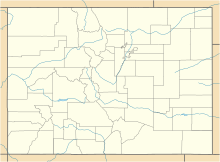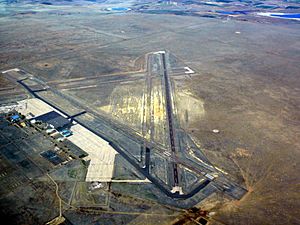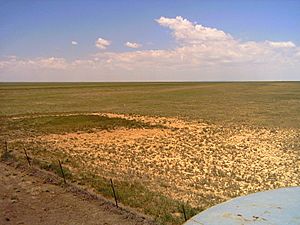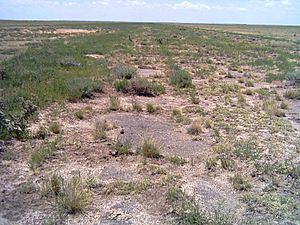La Junta Municipal Airport facts for kids
Quick facts for kids
La Junta Municipal Airport
(former La Junta Army Air Field)
|
|||||||||||||||
|---|---|---|---|---|---|---|---|---|---|---|---|---|---|---|---|

USGS 2006 orthophoto
|
|||||||||||||||
| Summary | |||||||||||||||
| Airport type | Public | ||||||||||||||
| Owner | City of La Junta | ||||||||||||||
| Serves | La Junta, Colorado | ||||||||||||||
| Location | Otero County, Colorado | ||||||||||||||
| Elevation AMSL | 4,229 ft / 1,289 m | ||||||||||||||
| Coordinates | 38°03′00″N 103°30′35″W / 38.05000°N 103.50972°W | ||||||||||||||
| Map | |||||||||||||||
| Runway | |||||||||||||||
|
|||||||||||||||
| [[Helipad|]] | |||||||||||||||
|
|||||||||||||||
| Statistics (2010) | |||||||||||||||
|
|||||||||||||||
|
Source: Federal Aviation Administration
|
|||||||||||||||
La Junta Municipal Airport (ICAO: KLHX, FAA LID: LHX) is three miles north of La Junta, in Otero County, Colorado, United States. The National Plan of Integrated Airport Systems for 2011–2015 categorized it as a general aviation facility.
Many U.S. airports use the same three-letter location identifier for the FAA and IATA, but this airport is LHX to the FAA and has no IATA code.
History
The history of the airport began in 1935 with initial development by the Civil Aeronautics Authority. In 1940 the War Department leased the facility for civil pilot training of British RAF and Royal Canadian Air Force pilots in four-engine aircraft.
In 1942 the airport was taken over by the United States Army Air Forces and assigned to the Western Flying Training Command (WFTC) and the airfield was expanded to accommodate a large number of aircraft and training flights. Three asphalt runways were constructed in a triangle layout, 8000x150 (NE/SW), 8000x150 (E/W), 8000x150 (NW/SE) along with a large aircraft parking apron, taxiways, landing aids and several large aircraft hangars. In addition, four auxiliary airfields were constructed to accommodate training flights and emergency landings:
- La Junta Aux #3 37°58′55″N 103°34′03″W / 37.98194°N 103.56750°W
La Junta Army Airfield was activated on November 2, 1942 and was designated as an advanced twin-engine flying school under the jurisdiction of the 83d Flying Training Wing (Advanced, Twin-Engine), Douglas Army Airfield, Arizona. It operated B-25 Mitchell twin-engine bombers and Cessna AT-17, Curtiss AT-9 twin-engine, and BT-15 Valiant and BT-13 Valiant single-engined trainers.
In March 1944 the Advanced Twin Engine School was re-designated as the 402d Army Air Force Base Unit. In March 1945, the unit was re-designated as the 249th Army Air Forces Base Unit (Army Air Forces Pilot School, Specialized Four Engine) and jurisdiction was transferred to Second Air Force in June. The mission of La Junta AAF then became the training of replacement heavy bomber pilots in AT-17 Flying Fortress trainers for eventual assignment to B-17 Flying Fortress bombers.
The 50th and 358th Fighter groups were assigned to La Junta in late 1945 (August - November) for inactivation.
La Junta AAF received notice from Second Air Force that it would be inactivated on 28 February 1946, and it was returned to the local government for civil use.
Historical airline service
La Junta received service by Continental Airlines with Douglas DC-3 aircraft from 1944 through 1957. The airport was one of several stops on a route between Denver and Tulsa which included stops at Colorado Springs, Pueblo, and Wichita.
More airport, city, and county history can be obtained from the Otero Museum and the Otero County Historical Society.
The airport was used as a filming location for the 1973 film by Terrence Malick titled Badlands.
Facilities
The airport covers 4,200 acres (1,700 ha) at an elevation of 4,229 feet (1,289 m). It has two runways: 8/26 is 6,849 by 75 feet (2,088 x 23 m) and 12/30 is 5,803 by 60 feet (1,769 x 18 m). It has one helipad, H1, 145 by 145 feet (44 x 44 m).
In 2010 the airport had 6,900 aircraft operations, average 18 per day: 95% general aviation and 5% military. 15 single-engine aircraft were then based at the airport.





